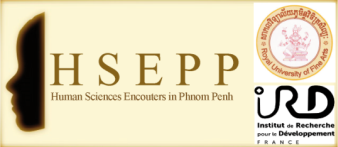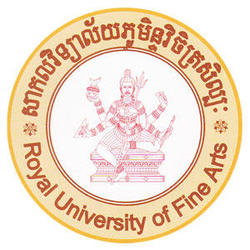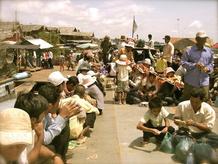Project initiators and partners
Initiators
UMI 233 trans VIH MI/INSERM U 1175
Université Royale des Beaux Arts Phnom Penh
Partners
http://sites.sas.upenn.edu/tlc/
logo tlcAgence Universitaire de la Francophonie - Bureau Asie Pacifique
HSEPP support the Manusastra Project
Who are we?
We are an international research network in Cambodia , dedicated to human and social sciences, built up in October 2008, and driven by Pascale Hancart Petitet.
The coordination network team
Since May 2012, the team is working in close collaboration with His excellency Dr. Bong Sovath, President of the Royal University of Fine Arts in Phnom Penh, Mr. Kong Vireak and then Mr. Chy Rotha, Registrar officers.
Dr. Bong Sovath, Rector of Royal University of Fine Arts Kingdom of Cambodia, Chairman of ASEAN COCI Sub-Committee on Culture /CAMBODIA Governing Board Member of the SEAMEO Regional Center for Archaeology and Fine Arts (SEAMEO/SPAFA)
Pascale HANCART PETITET, Creation and Direction of the HSEPP network
Anthropologist, Researcher Scientist at the Institut de Recherche pour le Développement UMI 233 INSERM U1175
Um Vutha, coordinator of the HSEPP network, bacchelor in archaeology in RUFA and INALCO in 2014, in 2016 he graduated in Master degree at INALCO and RUFA. He is civil servant for Ministry of Culture and Fine Arts of Cambodia.
Steven PRIGENT, co-director, edition and communication with universities in Cambodia
Anthropologist, PhD EHESS-Paris, Associate member IrAsia (CNRS UMR 7306)
Clémence SCHANTZ INGUENAULT, edition and communication with researchers in France
Ph. D. in socio-demography, CEPED UMR 196: University of Paris Descartes, INED, IRD
Eve Bureau, is in charge of relations with the research networks in France
Antropologist, PhD, Postdoctoral fellow with the Institut de Recherche pour le Développement (IRD), UMR 216
Kongkea OU, chief editor of the website (kh)
Graduated bachelor degree of Archaeology of Royal University of Fine Arts in 2011. Currently working for APSARA Authority, a government body in charge of protection and management of Angkor park in Siem Reap. Before working with APSARA, Kongkea used to work in different projects of both Archaeological and Anthropological field.
Caroline Bennett, Responsible of HSEPP developpement in Newzealand and Australia
Lecturer in cultural anthropology at Victoria University of Wellington, New Zealand Aotearoa.
Antoine Guide, in charge of media communication.
Network composition and aims
For its first meeting in November 2008, the network gathered only few participants, in September 2013 it encompasses more than 600 researchers and release information to more than 150 people involved in development programmes in Cambodia.
This network gathers researchers from different backgrounds working in Cambodia and/or on Cambodia, on a variety of scientific disciplines (mainly anthropologists and ethnologists, historians, archaeologists, geographers, linguists, criminologists, urbanists…) and people working mainly in educational and development areas.
The network welcomes 25% of Cambodian researchers working in Cambodia or abroad.
This network presents an important platform for social science research in Cambodia, forum for numerous interactions and collaborations. It also provides the means for its members to share information and publications in this field. It is now able to:
- to submit key stakeholders for students training courses;
- to monitor the interaction between researchers, necessary for the development and the implementation of projects;
- to organise larger seminars than the monthly meetings in Phnom Penh and/or to publish the presentations given at conferences.
The network members are gathering at least once a month, most of the time to listen to the presentation of an invited researcher and debate about it and sometimes to spark off debates and informal interactions around research work in progress. 56 conferences took place between November 2008 and January 2015.
These meetings are from now on welcomed within the Royal University of Fine Arts, in Phnom Penh.
Local rooting
The human science research network in Phnom Penh is now getting a high visibility among the scientific research landscape in Cambodia. Among the associated members of the network (researchers), there are representatives of several Phnom Penh universities and various public and private research centers like for instance, the Center of Khmer Studies (CKS), the Cambodian development policy research institute (CDRI), Pannas√Ęstra University, University of Cambodia, the Center for Advanced Study Phnom Penh, the Cambodia-Japan Cooperation Center and Puthisastra University.
Moreover, conferences being open to the general public, invited members (non researchers) are from different backgrounds, mainly governmental and non-governmental international and local organisations operating in Cambodia within health and development areas, people working for the Extraordinary Chambers in the Courts of Cambodia (ECCC), education and media scene stakeholders.
International visibility
The network encompasses researchers at different levels (master, PhD students, post doctorate, researchers, lecturers and professors) from various institutions mainly based in Europe, United-States and Asia.
In Europe, participants depends on French institutions (IRD, CNRS, INALCO, EHESS Paris, Sorbonne and Nanterre universities), English (Sussex, Oxford, Coventry), Dutch (Amsterdam University) German (Heidelberg and Berlin universities) Swedish (Uppsala university). Are also involved in the network researchers from American universities (Harvard, Cornell Berkeley, UCLA, Palo Alto, Emory, Columbia, Illinois, Hawa√Į), Canadian (British Columbia) Australian (Melbourne, Mc Gill), as well as scientists from Kyoto, Singapore and Taiwan universities.
Since March 2012, the network is welcomed within the Royal University of Fine Arts , in Phnom Penh. Activities in partnership with the Manusastra project , Francophone Master in human and social sciences, led by the Royal University of Fine Arts, in Phnom Penh, IRD, CNRS, INALCO, AUF and UNESCO are ongoing.
The network website is hosted and financed by the Institut de Recherche pour le Développement, a French research organisation, origina
l and unique on the European development research scene.
Previous members of the HSEPP team
Malinda To (coordination of the HSEPP network) Research assistant in anthropology in Globalmed project of the Institut de Recherche pour le Développement (IRD).
Emiko Stock (Coordination of the HSEPP network), PhD student, Anthropology, Cambodian Chams specialist, Ph.D. fellow at Cornell University
Gabriel Fauveaud (Coordination of the HSEPP network, Chief editor of the Website), Ph.D. in Urban Geography, Postdoctoral Fellow at the University of Montreal
Léo Mariani (Coordination of the HSEPP network), Ph.D. in anthropology, Research fellow F.R.S-FNRS, University of Liège, LASC
Colleen MCGINN (English edition & organisation of Academic Anonymous) Social Research Consultant, Relief and Development Advisor
Sopheak YOUK , (Coordination of the network and HSEPP conferences organisation)
Julie Blot, (chief editor of the website (eng, fr) and newsletter's editor) Geographer, PhD, University Paris IV-Sorbonne, associate researcher to CASE Laboratory
Sapho Briand (Coordination of the HSEPP network), Projects Coordinator (Manusastra and HSEPP), Institut for Development Researches (IRD)
Mawab NEDIR , (Student Trainee, Evaluation and development of HSEPP network activities), Master 2 ¬ę Expertise en Population et D√©veloppement ¬Ľ √† la Sorbonne ‚Äď Ren√© Descartes, Paris V.
Sophie Grégoire , (HSEPP questionnary follow up and analysis), Master 2, Cultural Geography, EHESS Paris and INALCO



















